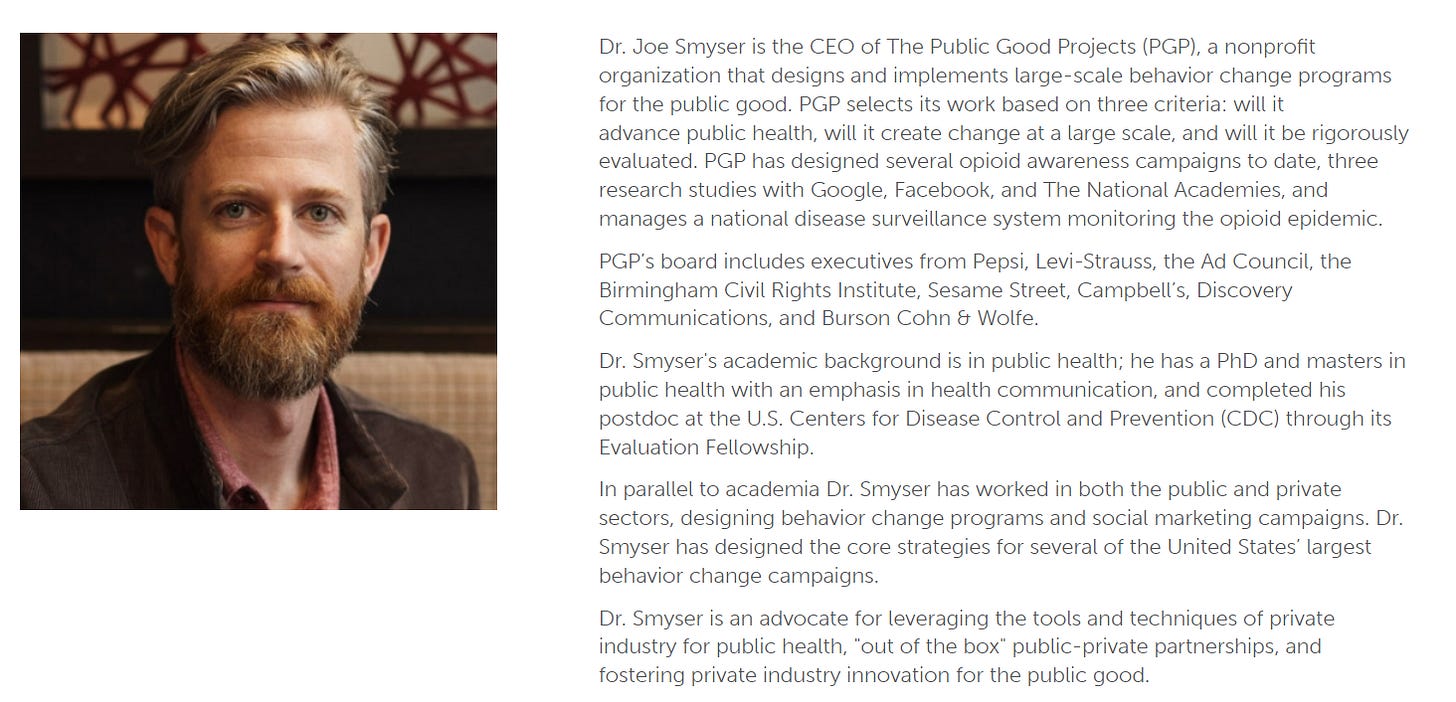Data Surveillance Files
Propaganda, Privacy, and Public Perception

During the COVID-19 pandemic, advanced technology and data analytics initiatives like Project Maven and Project Salus have played a significant role in collecting data on people, raising concerns about privacy and potential misuse. These projects highlight the power of integrating artificial intelligence (AI) and machine learning (ML) in various operational contexts, but they also emphasize the ethical and privacy challenges that come with such capabilities.

Project Maven, also known as the Algorithmic Warfare Cross-Functional Team (AWCFT), was launched in April 2017 by the U.S. Department of Defense (DoD). This project is now spearheaded by The National Geospatial-Intelligence Agency. The primary goal of Project Maven is to leverage AI and ML technologies to enhance the DoD's ability to process and analyze vast amounts of video footage and other imagery collected by surveillance systems, particularly drones. Before Maven, human analysts were responsible for reviewing countless hours of footage, a task that is both time-consuming and prone to errors due to fatigue and the sheer volume of data. Maven's AI algorithms automate the identification and categorization of objects, people, and activities within the footage, significantly increasing the speed and accuracy of intelligence gathering. This enhanced capability supports more efficient military operations and better-informed decision-making.

Project Salus, on the other hand, is a program designed to improve “situational awareness and decision-making” for law enforcement, first responders, and military applications. This program was supposedly initiated in March of 2020. It integrates data from a wide array of sources, including public data streams, government databases, surveillance systems, Internet of Things (IoT) devices, and private sector contributions.
By analyzing this data in real-time, Project Salus provides actionable insights that can enhance public safety, emergency response, and law enforcement operations. This initiative involves public-private collaboration between government agencies, technology companies, and research institutions to harness advanced analytics and AI for proactive decision-making in crisis situations. Specific details about the exact initiation and full scope of Project Salus are not extensively documented in public records, reflecting the confidential nature of such security-related initiatives

Dana Deasy, the Pentagon’s chief information officer, noted JAIC’s journey is still evolving. Meanwhile, the military is “generating positive momentum from our early days as AI pioneers toward a mature organization of AI practitioners,” he said.
The center is now starting to deliver real AI solutions to the warfighter while leading the Defense Department in AI ethics and governance, he noted.
Its budget is also growing. It went from $89 million in fiscal year 2019 to $268 million in fiscal year 2020, and the Pentagon plans to spend more than $1.6 billion over the next few years thanks to strong bipartisan support from Congress and Defense Department leadership, Deasy said.
The organization is already generating early returns on investment in its mission initiatives, from predictive maintenance to business process transformation, Deasy noted.
The center recently delivered an innovative engine health model predictive maintenance capability that is being utilized by Black Hawk helicopter maintainers from the U.S. Army’s Special Operations Aviation Regiment, he said.
Additionally, JAIC — via its business process transformation initiative — is delivering language-processing AI applications to the Washington Headquarters Service and the Pentagon’s administrative and financial management teams, Deasy said.
“These capabilities are automating the review of thousands of documents and memos for consistency, accuracy and compliance, thus increasing speed and efficiency while reducing manual, laborious processes,” he said.
The center is also laying down the foundations for the Joint Common Foundation, an AI development environment that will broaden opportunities for developers across the Pentagon to build and deliver artificial intelligence capabilities in a secure DevSecOps infrastructure, he said. According to the General Services Administration, DevSecOps promotes a cohesive collaboration between development, security and operations teams as they work toward continuous integration and delivery of products.
However, “while we develop and deliver these important near-term projects, we have to be ready for the contingencies of a changing and unpredictable operating environment,” Deasy said. “This is why I believe the true long-term success of the JAIC will depend on how the organization adapts and delivers real-world solutions when the strategic landscape and priorities change.”
The organization is already proving it can adapt via its Project Salus effort — which is named after the Roman goddess of health and well-being — that has helped with the federal government’s COVID-19 response, he said.
“Working alongside a team of private industry partners, the JAIC developed a predictive-logistics AI dashboard platform for the U.S. Northern Command that enabled National Guard teams to assist states and municipalities with mitigating panic buying and managing supply chains,” he said.
“That project went from concept to code in a matter of weeks. More importantly, it demonstrated the JAIC’s ability to support the emergent needs of a combatant commander and deliver real AI solutions during a national emergency.”
The extensive data collection capabilities of Project Maven and Project Salus raise significant privacy and ethical concerns. Without stringent safeguards, such data could potentially be used nefariously:
Surveillance and Monitoring: Monitoring social media platforms, public records, and private sector data without adequate transparency could lead to intrusive surveillance practices. For instance, analyzing social media posts and location data could be used to track individuals' movements and interactions, which could then be misused for political repression or social control.
Data Misuse: Misuse of collected data for unauthorized profiling, discrimination, or targeting of individuals based on sensitive personal information. For example, health data collected during the pandemic could be exploited by insurance companies to adjust premiums unfairly or deny coverage.
Lack of Consent: Inadequate consent mechanisms and transparency regarding data collection practices may infringe upon individuals' privacy rights. People may be unaware that their data is being collected and analyzed extensively, leading to a lack of control over their personal information.
Security Risks: Poor data security measures could lead to breaches, exposing sensitive personal information to malicious actors. This could result in identity theft, financial fraud, or other cybercrimes.

Image from https://imgflip.com/i/305iqq
Data collected through initiatives like Project Salus is typically stored in centralized databases maintained by government agencies, collaborating organizations, or contracted third-party providers. These databases are designed to handle large volumes of data from diverse sources and are often protected by encryption and other security measures to prevent unauthorized access and data breaches. Concerns about data security and privacy persist, especially given the potential for misuse or unauthorized access to sensitive personal information.

Similar initiatives during the COVID-19 pandemic include contact tracing technologies like the Apple-Google Exposure Notification System and Singapore's TraceTogether app. These technologies use Bluetooth to track exposure to COVID-19 by alerting users if they have been in close proximity to someone who tested positive. Health monitoring platforms like the Johns Hopkins University COVID-19 Dashboard and IBM Watson Health have also been crucial, aggregating global COVID-19 data and using AI to provide insights to health organizations.

Surveillance and monitoring systems, such as China’s Health Code System and Israel’s Shin Bet surveillance, monitored movement and access to public spaces based on individuals’ health status and travel history.
Data integration platforms like Palantir’s Foundry and Microsoft’s Healthcare Bot played significant roles, integrating data from multiple sources to provide comprehensive insights for managing public health responses and logistics.
These initiatives raise privacy concerns similar to those associated with Project Maven and Project Salus. The rapid implementation of contact tracing apps, for instance, involved collecting location and proximity data without sufficient transparency or explicit consent.
Similarly, weather and utility apps, social media platforms like Facebook and Twitter, smart home devices like Amazon Echo and Google Nest, wearable devices, and browsers like Google services and Microsoft Edge, have all been reported to collect data on users without their explicit knowledge.

Government surveillance programs, exemplified by initiatives like PRISM, demonstrate how extensive data collection from tech companies can occur without public awareness, often justified by national security concerns. These programs collect vast amounts of data through various channels, integrating it for purposes ranging from targeted advertising to national security and counter-terrorism, raising significant ethical and privacy issues.
The COVID-19 pandemic has highlighted the balance between leveraging advanced technology for public health and safety and addressing privacy and ethical challenges. It highlights the importance of robust data governance, transparency, informed consent, and strong data protection measures to prevent misuse and ensure that data collection practices respect individual privacy rights.
While projects like Maven and Salus seem to offer significant benefits for improving supposed public safety, defense, and health crisis management, their potential for misuse cannot be ignored.

The capability to collect, integrate, and analyze vast amounts of data, if not properly regulated and safeguarded. This seriously could lead to intrusive surveillance, data misuse, lack of consent, and significant security risks without proper consent or by following regulatory statutes. It is crucial to establish and enforce robust data protection frameworks to ensure that the benefits of these technologies are realized without compromising individual privacy and ethical standards.

Founded in 2011, Zignal Labs is a media intelligence and analytics company that provides tools and services for real-time media monitoring and analysis. Their platform enables organizations to track and analyze media mentions across various channels, including social media, news outlets, and broadcast media. This helps businesses, government agencies, and other organizations understand public sentiment, detect misinformation, and manage their reputations.
Zignal Labs partners with a range of organizations to enhance its capabilities and expand its reach. Notable partners include Twitter, Facebook, Google Cloud, AWS, Salesforce, IBM Watson, and Snowflake. These partnerships enable Zignal Labs to offer comprehensive media intelligence solutions, helping clients effectively monitor and respond to the rapidly changing media landscape.
Zignal Labs has notable connections with various government agencies, including the Department of Defense (DoD). Their services are utilized to monitor and analyze media in real-time, providing insights into public sentiment and information dissemination. This capability is particularly valuable for the DoD and other government agencies in detecting misinformation, managing crises, and understanding public sentiment for policy making and strategic communication.

In addition to the DoD, Zignal Labs has connections with the Department of Homeland Security (DHS) for monitoring and responding to threats, and the Centers for Disease Control and Prevention (CDC) for tracking public sentiment and misinformation related to health issues. Various corporations across industries also use Zignal Labs for brand monitoring, reputation management, and competitive intelligence.
Zignal Labs, known for real-time media monitoring and analysis, collaborates with entities like Anomaly Six (A6), a government contractor specializing in mass surveillance through extensive user data. A6, based in Alexandria, VA, was revealed in a presentation obtained by The Intercept to track approximately 3 billion devices in real-time, utilizing GPS pings and a database of 2 billion email addresses to identify device owners. This data was acquired from thousands of apps that collect user information upon sign-up, exploiting user agreements often unread by consumers.
The presentation proposed integrating A6's data capabilities into Zignal Labs' operations to enhance global social media surveillance. This integration would enable Zignal Labs to identify and track Twitter users' identities and locations, potentially monitoring interactions and locations during tweets. Additionally, the pitch suggested future applications where Zignal Labs could assist government agencies in monitoring foreign troop movements, illustrating the broad surveillance capabilities and implications of data analytics firms like A6 in collaboration with tech companies and government entities.
Reached for comment, Zignal’s spokesperson provided the following statement: “While Anomaly 6 has in the past demonstrated its capabilities to Zignal Labs, Zignal Labs does not have a relationship with Anomaly 6. We have never integrated Anomaly 6’s capabilities into our platform, nor have we ever delivered Anomaly 6 to any of our customers.”
When asked about the company’s presentation and its surveillance capabilities, Anomaly Six co-founder Brendan Huff responded in an email that “Anomaly Six is a veteran-owned small business that cares about American interests, natural security, and understands the law.”
Partnerships with non-profits like The Public Good Projects, founded by Joe Smyser, highlight Zignal Labs' role in providing crucial media intelligence services across a wide range of sectors, enhancing the ability of organizations to control the dynamic media environment effectively (use propaganda or what Joe Smyser likes to refer to as large-scale behavioral modification operations).
Smyser's partnership with Zignal Labs, known for real-time media monitoring and analysis, further integrates data analytics into supposed public health strategies. While Zignal Labs serves various sectors, including governmental agencies, their capabilities in social media analysis have implications for both public health communication and potentially defense operations, highlighting broader applications of data analytics technologies across different fields. This illustrates the intersection of public health, technology, and national security in contemporary media environments.

The Public Good Projects (PGP) is a public health nonprofit organization focused on using media and technology for strategic communications and behavior change. Joe Smyser, PGP's CEO, has helped oversee or was involved in initiatives like Shots Heard, Stronger, and Team Halo, which aimed to address public health issues through targeted media campaigns and data analytics. These projects, however, have been criticized for their surveillance and propaganda-like approaches, using social media monitoring to track health-related misinformation and trends. They also were instrumental in getting medical professionals who spoke out against the COVID-19 narrative delicensed through intense smear campaigns on social media and in real life. These initiatives and projects can be linked back to the United Nations (UN), World Health Organization (WHO), and ultimately the World Economic Forum (WEF).
Project VCTR (Vaccine Confidence, Trust, and Resilience) is a specific initiative under PGP focused on increasing public confidence in vaccines. It utilizes data analytics to understand public sentiment and misinformation around vaccines, informing communication strategies to promote vaccine acceptance. Smyser has collaborated with international bodies like the UN and WHO on these projects, emphasizing their global reach and influence. So why isn’t the
At the time of writing this article it was observed that the PGP website has undergone unexplained changes. The previous site is now inaccessible, which previously associated PGP with initiatives such as Shots Heard, targeting medical professionals who voice dissent by seeking their delicensing, and Team Halo, a UN-affiliated propaganda effort aimed at countering "misinformation” amongst other links that implicate PGP with possible wrongdoing. Is evidence purposely being removed?
The altered Public Good Projects newer website can be found here: https://www.publicgoodprojects.org/
These military project like Maven and Salus, along with contractors like Zignal Labs an others partnered with the UN and WHO initiatives overseen by Joe Smyser and The Public Good Projects, have played pivotal roles in conducting extensive surveillance and propaganda campaigns. These operations have involved the collection of private data and the manipulation of public behavior, particularly evident during the pandemic. These efforts may have influenced individuals' decisions, impacting their levels of fear, vaccination choices, and behavioral responses. This was and continues to be one of the largest surveillance and propaganda campaigns ever seen throughout history. But it has all been done for the greater good, right?
What's particularly intriguing is the clear evidence suggesting a conspiracy involving multiple military and global public-private partnerships in orchestrating the pandemic as a planned and staged event. The puzzling aspect is why the Select Subcommittee on the Coronavirus Pandemic appears fixated solely on one individual, Anthony Fauci, while seemingly overlooking other key players involved in this complex scenario. Strange indeed.















Great post!
This post helps me see why the Owners have to use the Intelligence Agencies and Defense Departments and all their tentacles to run their New World Order Surveillance Panopticon.
They need the plausible "national security" reasons and the ability to make sure their private partners will always cough up the data. "public-private partners" = Fascism.
Public Good Projects=WEFFIE Infodemic Warriors and Moderna.
https://sagehana.substack.com/p/while-you-were-being-laser-pointed
----
This is why your Tier Two stayed focused on Pfizer while Security State Pharm Moderna got hands off.
NOC for 31 years until Wheelers murder in 2010. I'm sick to my stomach that the tons of intel, some has been trashed by patriots who said this would never be... "idiots". There is no other reason that Oklahoma, 911, anthrax or project contagion would have been if national security and politicians (both left and right) would have moved on any of our field work. This wasn't the case when Reagan was in office, or at least until Strauss buddies including Bush and Chaney stabbed him in the back and Casey murdered in 87. Hillary, Sanders, Obama, Carter all worked with Strauss. All of these events and patriot surveillance could have been prevented. And even more so what's to come could have been stopped. Is anyone awake out there? NO. Who made the vaccine that killed millions of military age nationalist around the world in 1917? It wasn't the Spanish flu it was Felix Derenski's poison apple. Who started the largest collections of connected biological weapons programs in the world in 1901 on his birthday? Felix and Trotsky Who was Mark Francis? Who is Nora Volkow? Who was Larry Silverstein's grandfather? Who was Fauci's grandfather? Strauss owned DC both left and right from laundered cash coming from China and Russia. Iran, Israel and the Ukraine leadership were front and center. The UK has some of the same issues. 31 yrs can't go in a text but the files and huge collection of data would.